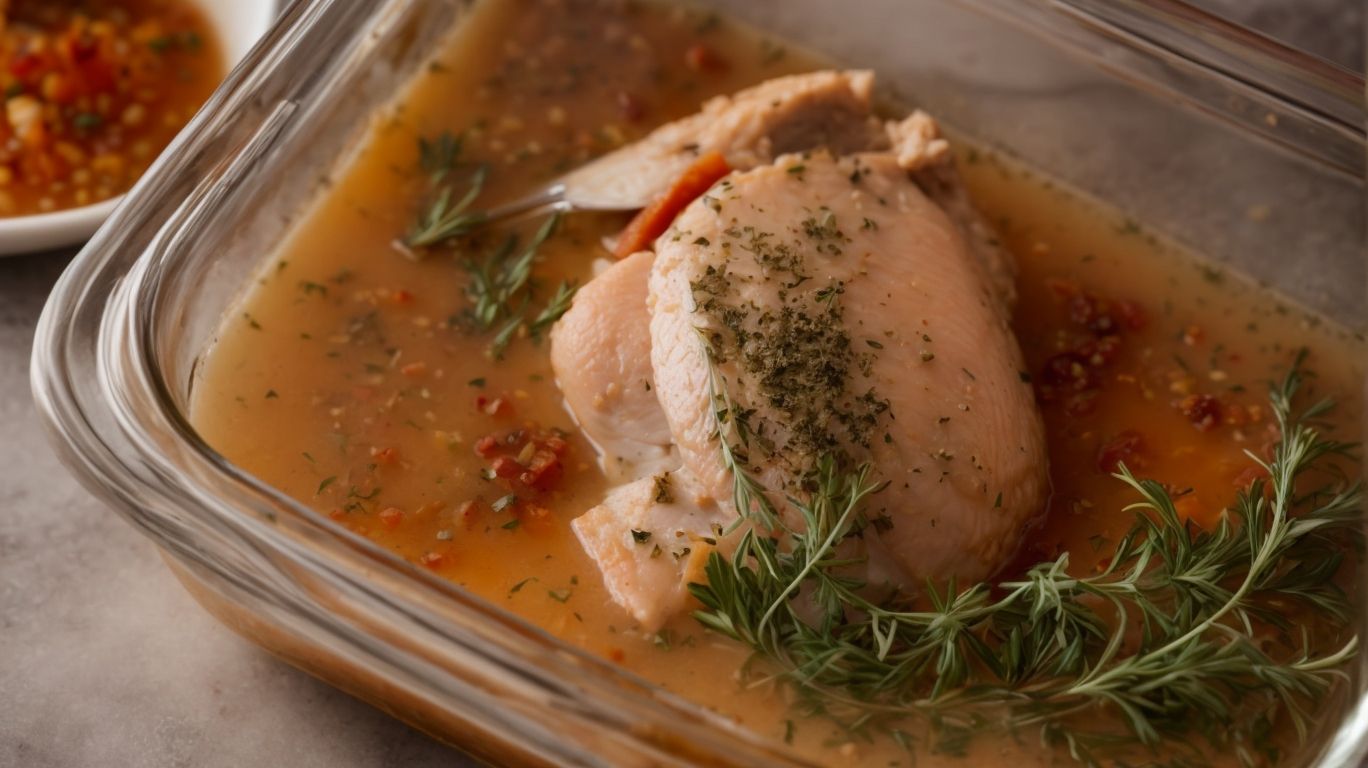How to Bake Marinated Chicken?
Looking to elevate your chicken dishes to the next level?
Marinating chicken is the key to creating flavorful and juicy meat that will leave your taste buds wanting more.
In this article, we’ll explore what marinated chicken is, why it’s important to marinate your chicken, how to marinate chicken effectively, and tips for baking marinated chicken to perfection.
If you’re ready to up your culinary game and impress your friends and family with a delicious meal, keep on reading!
Key Takeaways:
What is Marinated Chicken?
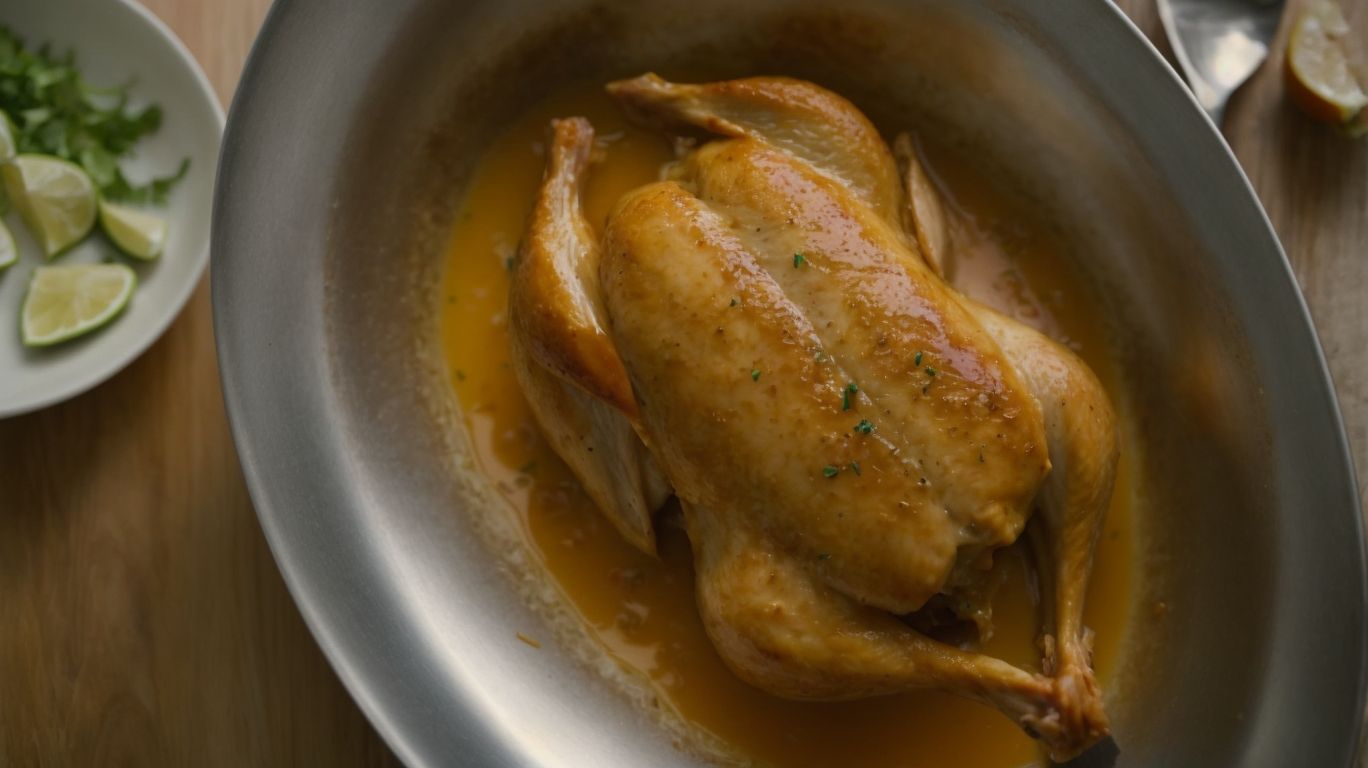
Credits: Poormet.Com – Walter Green
Marinated chicken refers to chicken that has been soaked in a seasoned liquid mixture before cooking or grilling, enhancing its flavor, tenderness, and overall juiciness.
This process allows the chicken to absorb the flavors of herbs, spices, oils, and acids, like lemon juice or vinegar, resulting in a more flavorful and succulent dish. Marinating not only adds a depth of taste to the meat but also helps tenderize it by breaking down the muscle fibers. The marinade helps to keep the chicken moist during the cooking process, preventing it from drying out and becoming tough. To ensure that marinated chicken is cooked thoroughly and safely, using a meat thermometer is crucial.
Why Marinate Chicken?
Marinating chicken serves multiple purposes: it adds rich flavors, tenderizes the meat fibers, and helps retain moisture during the cooking process, resulting in juicy and flavorful protein.
When marinating chicken, the flavors from the marinade ingredients penetrate deep into the meat, infusing it with a delicious taste profile that enhances the overall dining experience. The acidic components in the marinade help break down the proteins in the chicken, leading to a more tender and succulent texture once cooked. The moisture retained by the marination process prevents the chicken from drying out, ensuring a moist and delectable end result that will have your taste buds dancing with delight.
Adds Flavor
Adding flavor to chicken through marinades involves infusing the meat with a blend of seasonings, spices, and other ingredients that help create a rich and aromatic taste profile.
Each marinade recipe offers a unique combination of flavors that can transform a simple chicken dish into a culinary delight. Whether it’s a tangy citrus-based marinade or a spicy blend of herbs and spices, the key lies in the meticulous selection and balance of ingredients.
Marinating chicken not only imparts flavor but also helps tenderize the meat, resulting in juicier and more succulent bites. This process allows the flavors to penetrate the chicken, enhancing its overall taste with each bite.
Tenderizes the Meat
Marinating chicken not only adds flavor but also helps tenderize the meat, breaking down tough fibers and ensuring a more succulent and enjoyable dining experience.
When chicken is marinated, the acidic components in the marinade, such as vinegar or citrus juices, work to denature the proteins in the meat. This process essentially ‘pre-cooks’ the surface of the chicken, leading to a quicker and more even cooking process when it’s ready to be pan-seared or grilled. Along with acidic elements,
enzymes
found in ingredients like papaya or kiwi can further aid in tenderizing the meat by breaking down proteins. For those looking to expedite the tenderization process, using a meat mallet or tenderizing tool can help physically break down the muscle fibers, resulting in a more uniform texture throughout the chicken.
Keeps the Chicken Moist
Marinating chicken is crucial to keeping the meat moist throughout the cooking process, preventing dryness and ensuring a juicy and flavorful outcome for the dish.
By allowing the chicken to sit in a marinade, the flavors penetrate the meat, infusing it with a depth of taste that enhances every bite. The acid in marinades also helps tenderize the chicken, resulting in a more succulent texture. The fats and oils in the marinade coat the chicken, creating a protective barrier that locks in moisture while cooking.
How to Marinate Chicken?
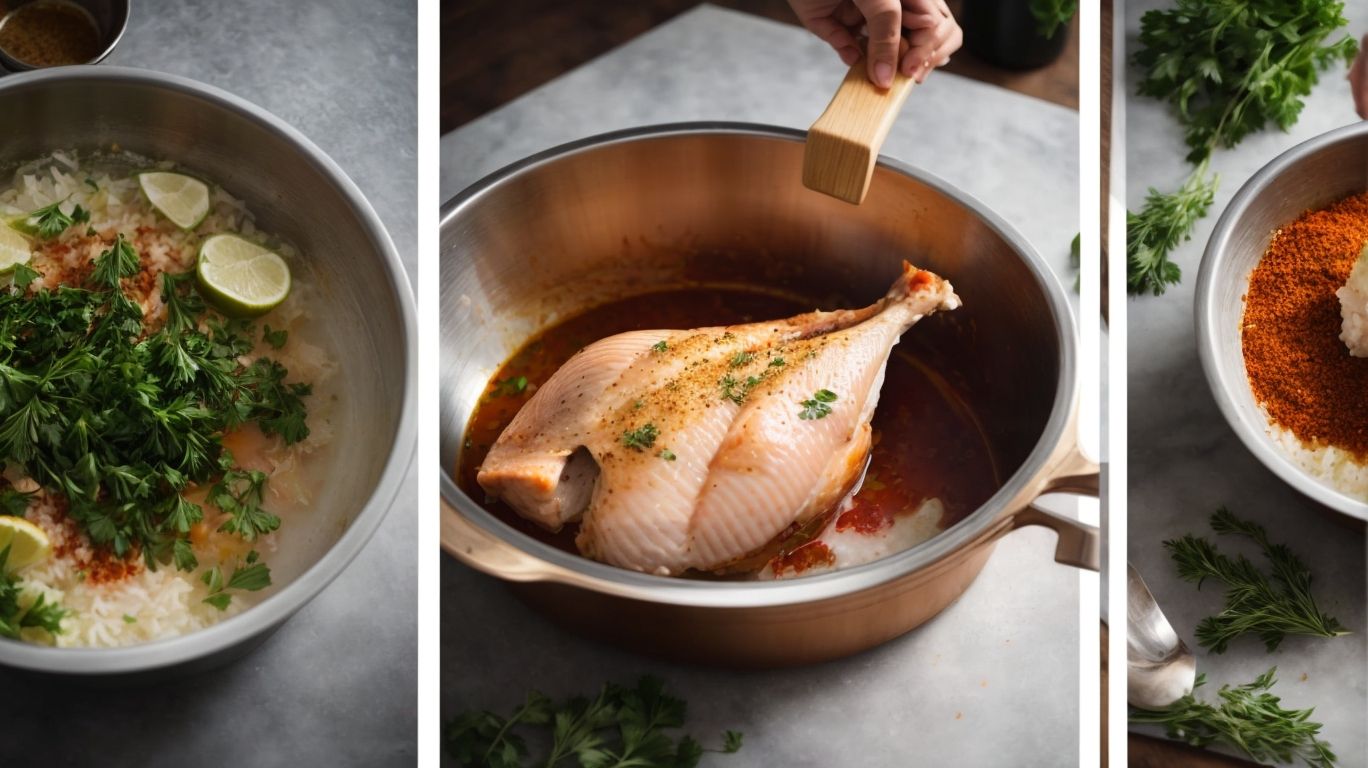
Credits: Poormet.Com – Brian Allen
The process of marinating chicken involves selecting the right marinade, preparing the meat, and allowing it to soak in a seasoned mixture to enhance its flavor and texture.
Choosing the ideal marinade is crucial as it sets the foundation for the entire dish. Marinades can range from simple oil and vinegar mixes to complex blends of herbs and spices that cater to diverse flavor profiles. Different marinades offer unique taste experiences, with elements such as citrus juices, soy sauce, yogurt, or even wine infusing the meat with distinct flavors.
After selecting the marinade, the next step involves preparing the chicken to facilitate optimal absorption of flavors. Trimming excess fat, scoring the meat, or creating small incisions in thicker parts can help the marinade penetrate deeper, ensuring a more flavorful end result.
Choose the Right Marinade
Selecting the right marinade is essential for marinating chicken, as it determines the overall flavor profile and taste complexity of the dish.
Marinades play a crucial role in infusing chicken with a delightful blend of flavors and aromas. Different marinades can evoke various culinary experiences, from tangy and zesty to spicy or sweet. Experimenting with spices, herbs, acids like vinegar or citrus, and oils can lead to intriguing taste combinations that elevate the simple chicken dish to a gourmet masterpiece.
- Teriyaki marinade: known for its sweet-savory taste, typically made with soy sauce, ginger, garlic, and honey, perfect for grilling or stir-frying juicy chicken.
- Greek yogurt marinade: offers a creamy texture and tangy flavor, often blended with lemon, garlic, and herbs, great for adding moisture and richness to grilled chicken.
- Cajun spice rub: a bold mix of paprika, cayenne, thyme, and garlic that brings a spicy kick to chicken, ideal for those who love a bit of heat in their dishes.
Prepare the Chicken
Before marinating chicken, it is essential to season the meat, ensure proper thickness for even absorption of flavors, and create small cuts to enhance the marinade penetration.
Start by patting the chicken dry with paper towels to remove excess moisture that could dilute the marinade. This ensures that the flavors penetrate deeply into the meat.
Next, check the thickness of the chicken breasts or thighs; you can use a meat mallet or carefully slice through the thicker parts to achieve uniform thickness.
Creating small incisions, also known as scoring, on the chicken surface helps the marinade seep into the meat, infusing it with delicious flavors. Be careful not to cut too deeply to maintain the structural integrity of the meat. These steps are crucial in preparing the chicken for marination and can significantly enhance the overall taste and tenderness of the dish.
Marinate the Chicken
Marinating chicken requires allowing the meat to sit in the seasoned marinade for a specified period, ensuring that the flavors permeate the protein thoroughly before cooking.
For the optimum infusion of flavors, it is recommended to marinate chicken for at least 30 minutes to 24 hours. This timeframe ensures that the chicken absorbs the marinade’s essence, creating a harmonious blend of taste and tenderness. Longer marination periods, up to 24 hours, are ideal for deeper flavor penetration.
How Long Should You Marinate Chicken?
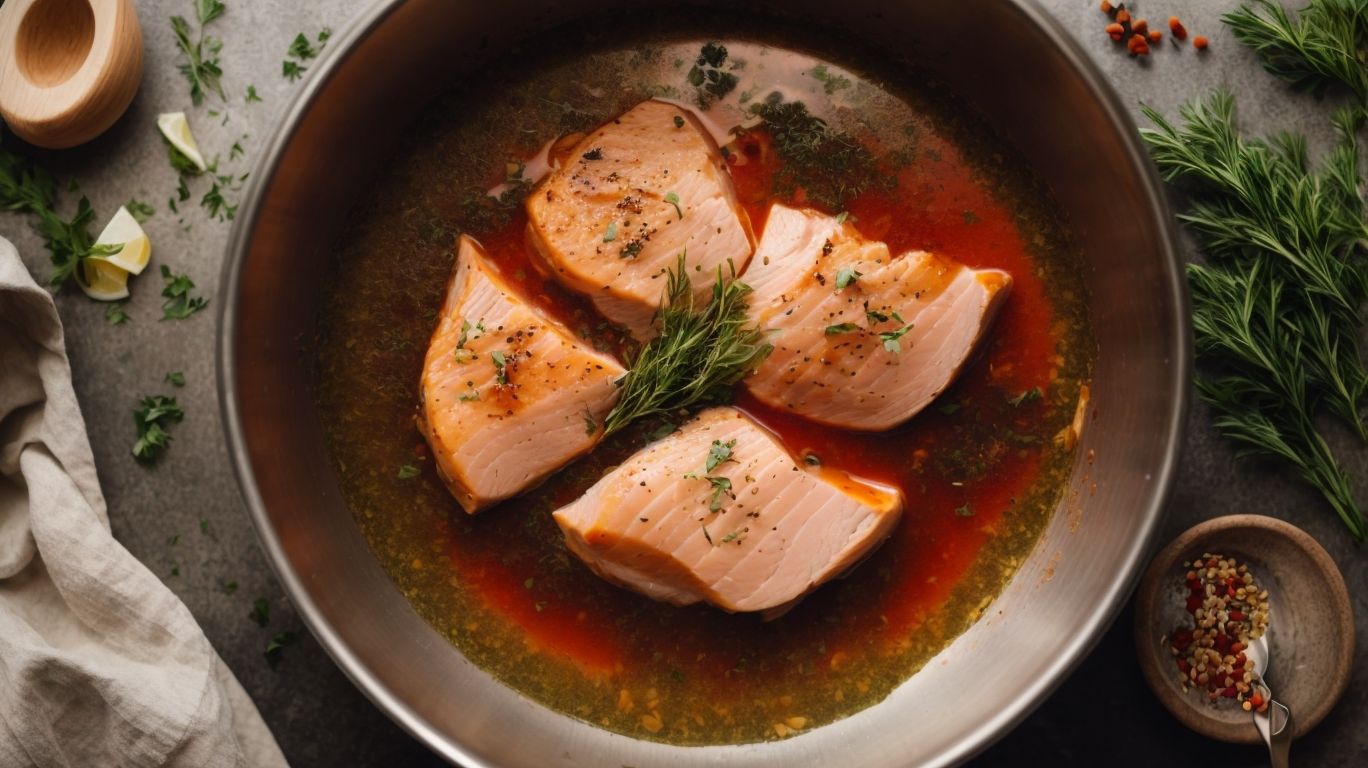
Credits: Poormet.Com – Ralph Smith
The ideal marination duration for chicken varies depending on the recipe and the type of marinade used, with recommendations typically ranging from 30 minutes to overnight for maximum flavor infusion.
Factors such as the acidity in the marinade can significantly influence how long the chicken should be marinated. Generally, acidic marinades, like those containing citrus juices or vinegar, break down the proteins faster, thus requiring shorter marination times. On the contrary, thicker cuts of chicken or tougher meat parts may benefit from longer marination periods to allow the flavors to penetrate deeply. It’s also crucial to consider the desired flavor intensity; some recipes call for a quick marination for subtle hints, while others demand overnight soaking for a robust taste.
What Temperature Should You Marinate Chicken?
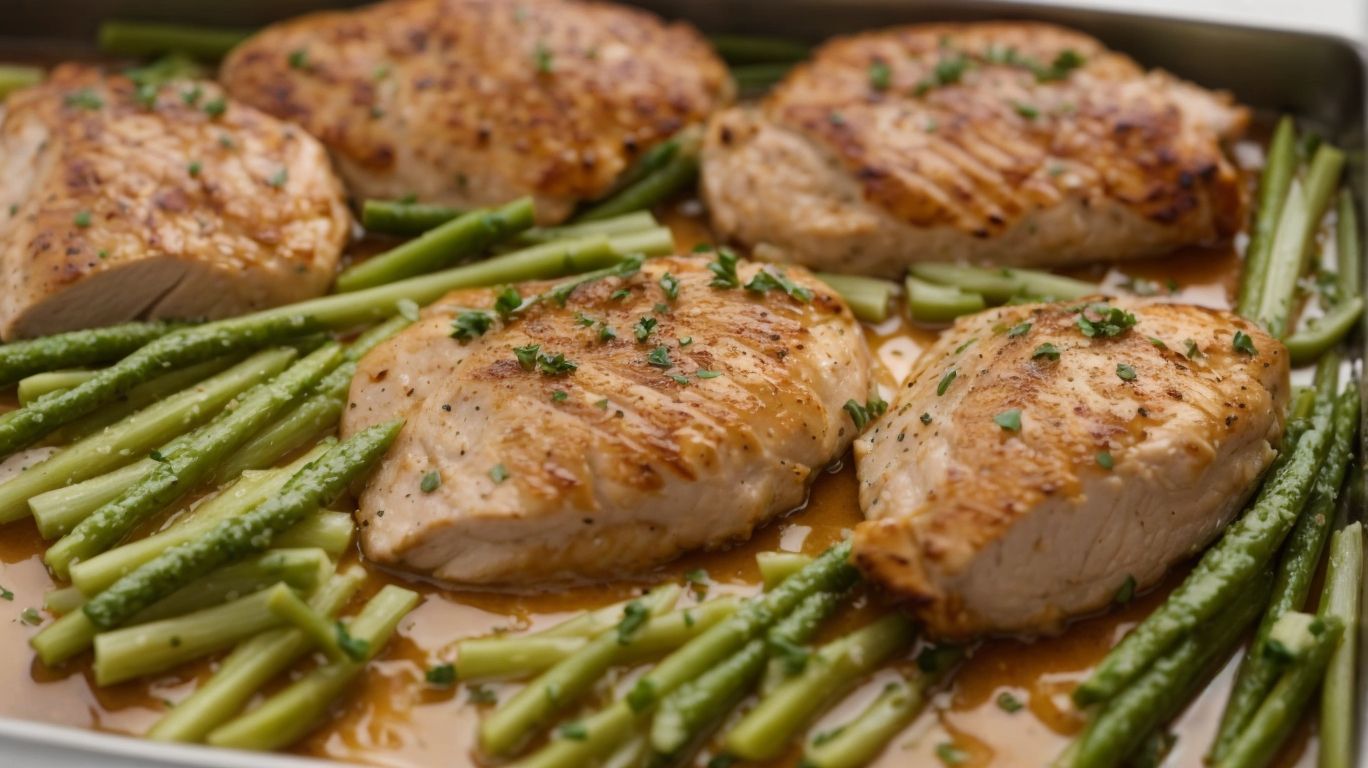
Credits: Poormet.Com – Charles Lee
When marinating chicken, it is crucial to maintain a consistent refrigeration temperature of 40°F (4°C) or below to inhibit bacterial growth and ensure food safety throughout the marination process.
By keeping the chicken at this optimal temperature, you are effectively preventing harmful bacteria from multiplying and contaminating the meat. This temperature range is known to slow down the growth of bacteria, minimizing the risk of foodborne illnesses.
Proper control of refrigeration temperature not only safeguards your health but also plays a vital role in preserving the flavor and texture of the chicken. Ensuring that the marination process takes place under ideal refrigeration conditions is fundamental in maintaining high food safety standards.
How to Bake Marinated Chicken?
Baking marinated chicken involves preheating the oven, preparing the chicken for baking, cooking it at the recommended temperature, and ensuring it reaches the desired level of doneness for a delicious outcome.
Preheat your oven to the specified temperature as per your recipe, typically around 375°F to 400°F. While the oven is heating up, prepare your marinated chicken by laying it out evenly on a baking tray lined with parchment paper or aluminum foil to prevent sticking.
Once the oven is ready, place the chicken tray on the middle rack. It’s crucial to cook poultry at a safe internal temperature of 165°F (74°C) to ensure it’s thoroughly cooked. An effective way to check for doneness is by inserting a meat thermometer into the thickest part of the chicken; if the temperature reads 165°F, your chicken is ready!
Preheat the Oven
Before baking marinated chicken, it is crucial to preheat the oven to the recommended temperature (e.g., 375°F) to ensure even cooking and optimal flavor development.
Proper preheating is what sets the foundation for a successful culinary journey with your chicken dish. When the oven is heated beforehand, it creates an ideal environment for the marinated chicken to cook through evenly.
Temperature consistency plays a key role in the final taste and texture of the poultry. Without preheating, the chicken may end up with unevenly cooked portions or a lack of that desired golden crust.
Prepare the Chicken for Baking
Preparing marinated chicken for baking involves arranging the meat on a baking sheet lined with parchment paper, ensuring even thickness for uniform cooking, and seasoning it further for enhanced flavors.
Placing the marinated chicken on the parchment paper-lined baking sheet helps prevent sticking and allows for easy cleanup. To ensure even cooking, aim for consistent thickness in the chicken pieces; use a meat mallet to pound thicker areas gently. Optimal flavor can be achieved by adding a sprinkle of additional herbs, garlic powder, or a drizzle of olive oil on top of the chicken before placing it in the oven.
Bake the Chicken
Baking marinated chicken involves placing the prepared meat in the preheated oven and cooking it for the specified duration at the recommended temperature until it reaches a golden brown and cooked through consistency.
To start the process, preheat the oven to 375°F (190°C) to ensure an even cooking temperature. Depending on the thickness of the chicken pieces, the cooking time can vary; typically, boneless pieces require around 25-30 minutes, while bone-in cuts may need an additional 10-15 minutes. To achieve the desired golden brown exterior, consider brushing the chicken with oil or butter halfway through the cooking process, and then broil it for the last 5-10 minutes. This final step helps to crisp up the skin and enhance the color for a visually appealing finish.
Check for Doneness
To ensure that the baked marinated chicken is cooked to perfection, use a meat thermometer to check the internal temperature, aiming for a minimum reading of 165°F (74°C) for safe consumption.
Using a meat thermometer is crucial as it guarantees that the chicken is not only safe to eat but also preserves its juiciness and flavor. When inserting the thermometer, make sure to place it in the thickest part of the meat without touching any bones, as this can give a false reading.
If the temperature is below the recommended 165°F (74°C), continue baking the chicken and recheck periodically to avoid overcooking. Overcooked chicken can be dry and less enjoyable.
Remember, checking the internal temperature of the chicken provides the ultimate assurance that your dish is both safe and delicious.
Tips for Baking Marinated Chicken
Achieving perfectly baked marinated chicken involves tips such as monitoring the cooking time, ensuring a golden brown exterior, and allowing the meat to rest before serving to retain its juiciness and flavors.
For manage the cooking time effectively, consider preheating the oven to the proper temperature before placing the marinated chicken inside. This ensures even cooking throughout the meat, preventing undercooked or overcooked portions. To achieve that desirable golden brown crust, begin by searing the chicken in a hot skillet before transferring it to the oven. The initial sear locks in the juices and enhances the flavor profile.
Regarding enhancing the flavor through marinade techniques, experiment with different ingredient combinations such as herbs, spices, citrus juices, and yogurt-based marinades. These ingredients not only infuse the chicken with delicious flavors but also contribute to tenderizing the meat, resulting in a moist and flavorful end product.
What to Serve with Baked Marinated Chicken?
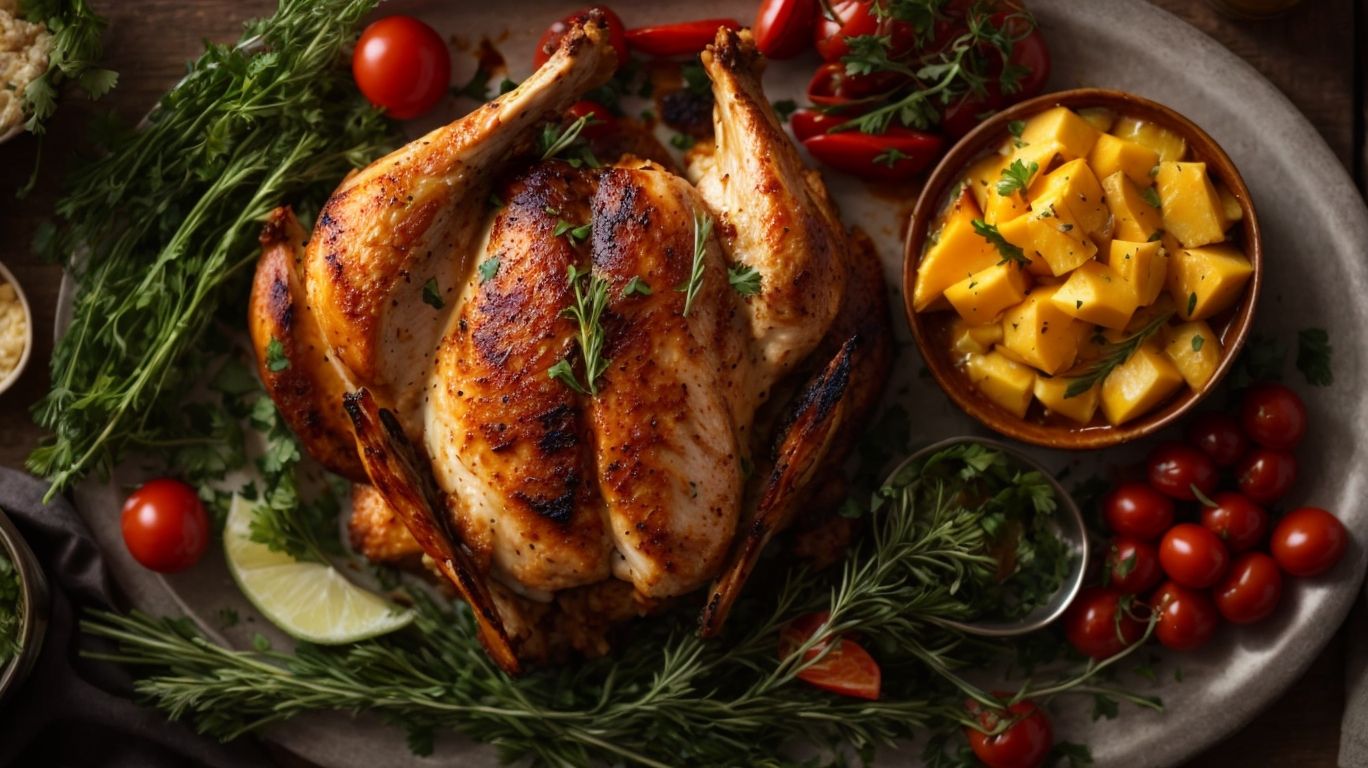
Credits: Poormet.Com – Jonathan Brown
Baked marinated chicken pairs well with a variety of side dishes and accompaniments, such as fresh salads, flavorful rice dishes, wholesome quinoa salads, or comforting soups and stews, creating a well-rounded and satisfying meal.
Regarding salads, a crisp garden salad with a tangy vinaigrette or a fresh Greek salad with feta cheese add a refreshing contrast to the savory flavors of the chicken. For rice variations, consider fluffy basmati rice infused with herbs or rich coconut rice for a tropical twist. Quinoa preparations like a zesty quinoa tabbouleh or a colorful quinoa and roasted vegetable salad bring a nutritious component to the meal.
Conclusion
In conclusion, marinated chicken offers a delicious and versatile cooking option that allows home cooks to create flavorful and tender protein dishes for various meals and occasions.
Marinating chicken not only infuses rich flavors but also helps in tenderizing the meat, making it juicy and succulent when cooked. The process involves soaking the chicken in a seasoned mixture, usually containing a blend of oil, acidic components like vinegar or citrus juice, herbs, spices, and sometimes dairy products like yogurt.
One of the key benefits of marinating chicken is that it adds depth and complexity to the final dish, elevating its taste profile. This technique is highly customizable, allowing you to experiment with different ingredients based on your preferences, ranging from tangy and citrusy marinades to spicy and aromatic ones.
Marinated chicken is incredibly versatile, suitable for grilling, baking, sautéing, or even skewering. The flavor-infused meat pairs well with various sides, from salads and rice dishes to wraps and sandwiches, offering a spectrum of meal options to cater to different tastes and preferences.
Frequently Asked Questions
1. How to Bake Marinated Chicken?
To bake marinated chicken, start by preheating your oven to 375°F. Place the marinated chicken on a baking dish and bake for 25-30 minutes, or until the internal temperature reaches 165°F. Let it rest for 5 minutes before serving.
2. Can I marinate chicken for baking overnight?
Yes, you can marinate chicken for baking overnight. However, it is important to keep it refrigerated and covered to prevent any potential foodborne illnesses.
3. How long should I marinate chicken for baking?
For best results, marinate chicken for at least 1 hour before baking. This allows the chicken to absorb the flavors of the marinade and become more tender.
4. Should I remove excess marinade before baking chicken?
Yes, it is recommended to remove excess marinade before baking chicken. This prevents the chicken from becoming too soggy and helps it cook evenly.
5. Can I use the leftover marinade to baste the chicken while it bakes?
No, it is not safe to use the leftover marinade as a basting sauce while the chicken bakes. This marinade contains raw chicken juices and can potentially cause foodborne illnesses if not cooked properly.
6. What are some recommended marinade ingredients for baking chicken?
Some popular marinade ingredients for baking chicken include olive oil, lemon juice, garlic, herbs, and spices. You can also use yogurt, buttermilk, or citrus-based marinades for a tender and flavorful chicken.

